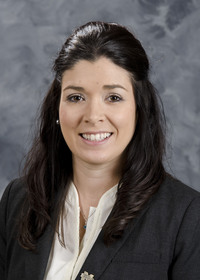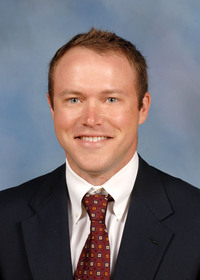Information Possibly Outdated
The information presented on this page was originally released on November 23, 2004. It may not be outdated, but please search our site for more current information. If you plan to quote or reference this information in a publication, please check with the Extension specialist or author before proceeding.
Manage winter cattle feed, pastures carefully
MISSISSIPPI STATE -- Every season brings its challenges to beef producers, and the winter weather means it's time to supplement what cattle graze on their own.
Brian Rude, beef nutritionist with the Mississippi Agricultural and Forestry Experiment Station, urged beef cattle producers to make thoughtful preparation for feeding during the winter months. Cattle often need supplements to meet their winter nutritional needs when grazing or eating stored hay.
"A lot of people are trained that they need to supplement for protein, but research has indicated that energy supplementation is more beneficial than protein supplementation," Rude said.
The energy type can influence cattle's ability to use feed efficiently and the amount of weight they gain. Energy sources can be starch-based, such as grain, or fiber- or cellulose-based, such as soybean hulls.
Rude recently completed a five-year evaluation of the effects of supplementing corn or hay to animals eating rye grass. He found no real difference in weight gain, and found the use of hay to be much more economical than supplementing with corn.
"You get the same gain by growing hay that you do with corn," Rude said. "The cattle aren't really getting any nutrients from the hay, but it is slowing down the rate of passage of the rye grass, so the cattle are able to obtain more nutrients from the rye grass they are grazing."
In ongoing research, Rude is looking at energy supplementation and how it can increase the number of animals grazing on rye grass per unit of land.
The quality of fescue as a forage is not as high as rye grass, so cattle grazing fescue typically need energy supplementation. Fescue that has been fertilized may provide all the protein cattle need without supplementation, but it should be analyzed for content.
"Feeding corn to cattle grazed on fescue improves weight gain. But since the microbial population in the rumen is geared to digesting fescue, it would seem logical that giving them a cellulose-based energy source such as soybean hulls would allow for more efficient utilization of both forage and supplement," Rude said.
Rye pastures have a particular challenge this year as the forage faces an unusually bad outbreak of blast, a fungus typically associated with rice. Richard Watson, Mississippi State University Extension Service forage specialist, said weather conditions this fall have been ideal for blast.
"September and October are typically two of the driest months of the year, but recently we've had atypical amounts of rainfall. That has really precipitated the problem," Watson said. "The optimum conditions for blast to occur are daytime temperatures above 75 degrees and cool nights where you get a lot of dew forming."
Left alone, blast quickly kills rye grass. It affects other grass species as well, but is most widespread on rye. Watson said the disease has most heavily infested the central and southern parts of the state.
Cool weather slows down blast, and really cold weather stops it. There are no chemical products labeled for pasture control of blast.
"The best thing is to remove the fungus and the disease tissue, and the best way to do that is to get some animals in there to eat it. Eating grass with blast does not affect the animal," Watson said. "The wrong way is to clip it. This leaves the diseased material there, and the fungus can complete its life cycle, produce some more spores and continue its spread."
Watson urged producers each year to be aware of conditions that encourage the spread of this disease and act quickly if arrives. In areas prone to problems with blast, sow small grains such as oats, rye and wheat alone or with rye grass, as these are not susceptible to blast.
"If the blast does hit, the cattle still have something to graze," Watson said.
Contact: Dr. Brian Rude, (662) 325-2933






